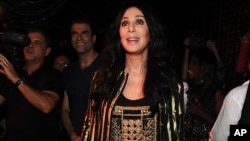MALIBU, CALIFORNIA —
Singer Cher said it was a “no-brainer” to turn down a chance to perform at next year's Winter Olympics in Russia because of the country's laws prohibiting gay propaganda.
“It was hard in one way to say 'no,' but in another way, it's a no-brainer,” the singer told Reuters this week.
“You can't do it. Your heart doesn't let you go there,” added Cher, whose son Chaz Bono has undergone gender transition surgery.
The 67-year-old singer of hits “Dark Lady” and “Believe” said earlier this month that she was offered a chance through a Russian friend to perform at the beginning of February's Winter Games in Sochi.
Cher gained a strong following in the American gay community in the 1960s and 1970s for her vampish stage persona and sexually ambiguous songs.
The Russian law forbids the distribution of information on homosexuality to minors, which critics say is discriminatory, and has sparked international backlash with criticism from the likes of pop star Madonna.
Actor Wentworth Miller and TV host Andy Cohen have declined invitations to the visit the country in protest.
Russia has denied that the law is discriminatory.
“It was hard in one way to say 'no,' but in another way, it's a no-brainer,” the singer told Reuters this week.
“You can't do it. Your heart doesn't let you go there,” added Cher, whose son Chaz Bono has undergone gender transition surgery.
The 67-year-old singer of hits “Dark Lady” and “Believe” said earlier this month that she was offered a chance through a Russian friend to perform at the beginning of February's Winter Games in Sochi.
Cher gained a strong following in the American gay community in the 1960s and 1970s for her vampish stage persona and sexually ambiguous songs.
The Russian law forbids the distribution of information on homosexuality to minors, which critics say is discriminatory, and has sparked international backlash with criticism from the likes of pop star Madonna.
Actor Wentworth Miller and TV host Andy Cohen have declined invitations to the visit the country in protest.
Russia has denied that the law is discriminatory.





